|
In This Issue...
 |
Jonah and Joseph |
 |
Helping Orphaned Wild Ducklings and Goslings |
 |
Get to know your predators:
Foxes |
 |
Waterfowl Nutrition |
 |
Migratory Bird Treaty Act |
 |
The Month in Photos! |
 |
Recommended Reading:
Bandy the Goose |
 |
Reader Poll #6
|
|
Migratory Bird
Treaty Act
The Migratory Bird Treaty
Act (MBTA), originally passed in 1918, provides protection
for migratory birds. Under the Act, it is unlawful to take,
import, export, possess, buy, sell, purchase, or barter any
migratory bird. Feathers or other parts, nests, eggs, and
products made from migratory birds are also covered by the
Act. Take is defined as pursuing, hunting, shooting,
poisoning, wounding, killing, capturing, trapping, or
collecting.
Penalties:
Individuals or
organizations may be fined up to $5,000 and $10,000
respectively, and may face up to six months imprisonment for
misdemeanor violations of the Act. Felony violations may
result in fines of up to $250,000 for individuals, $500,000
for organizations, and up to two years imprisonment.
Note:
It is illegal to keep
wild ducks & geese without state and federal wildlife
permits. If a wild duck, goose, duckling or gosling is in
immediate danger, you may carefully and humanely remove it
from peril. You must then arrange for the immediate transfer
of the bird to a licensed wildlife rehabber. See the article
on orphaned wild ducklings and goslings in this newsletter
to help you locate a wildlife rehabber near you.
Some of the information
above was obtained from:
U.S. Fish & Wildlife Service.
The Month in
Photos!
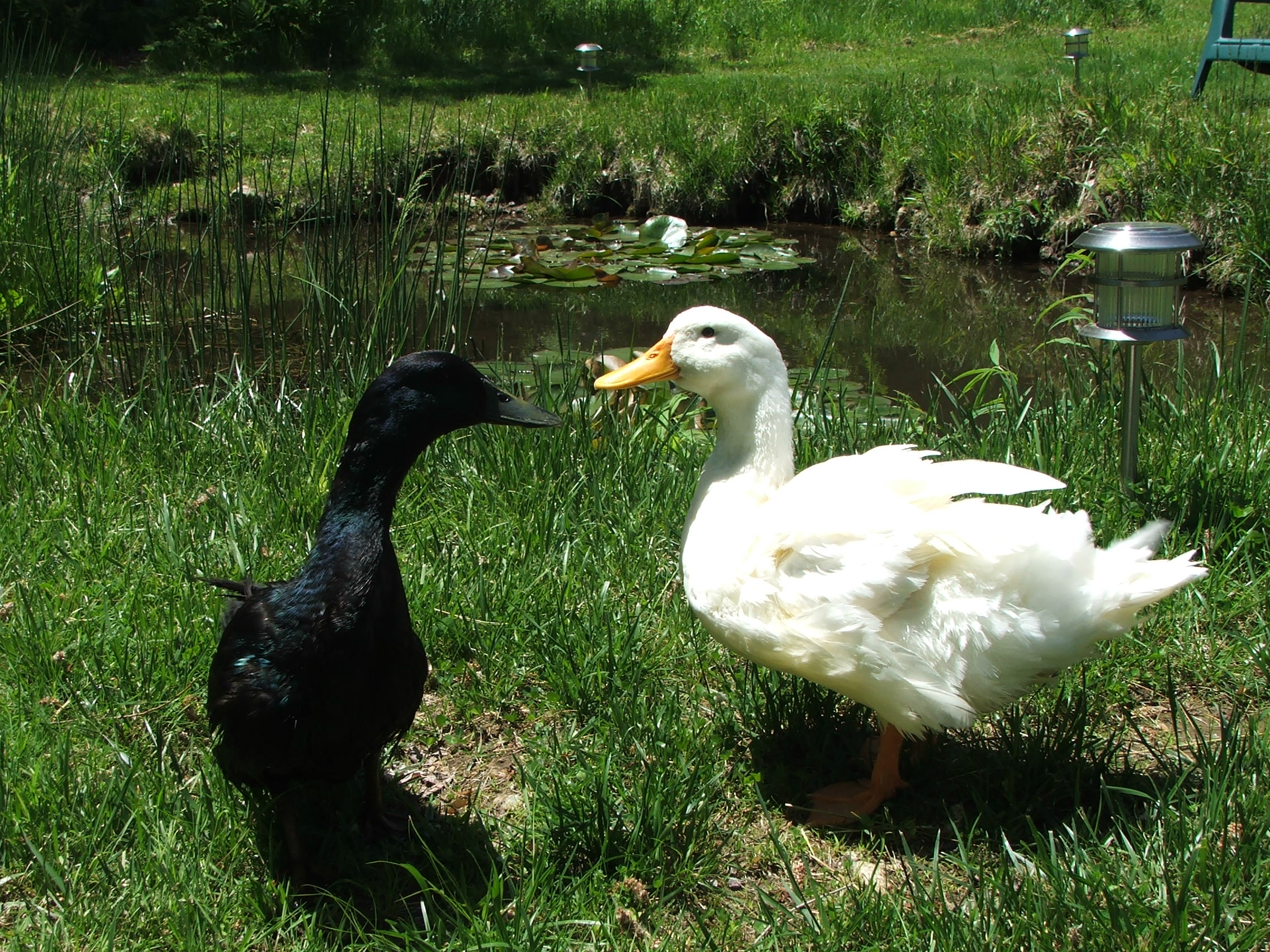
Winston & Mr. Pearl arrive!
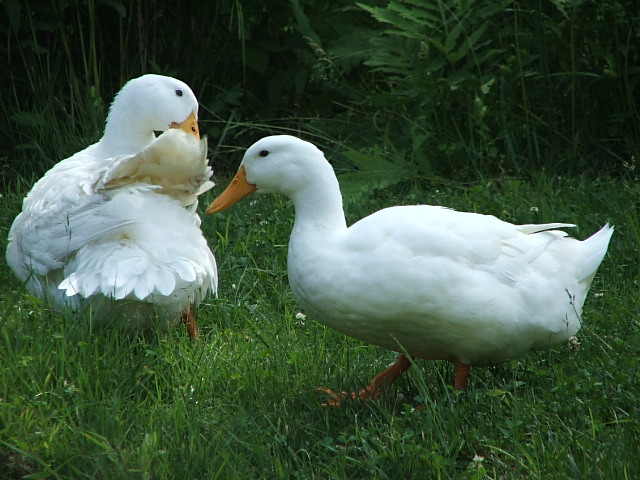
Deirdre & Young Jeffrey
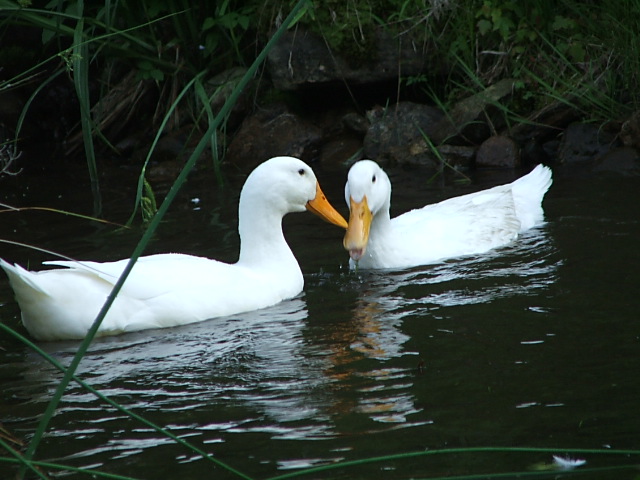
"You're so pretty!"
Recommended
Reading
Author Marcia Croce Martin
contacted us about a wonderful inspiring book she wrote
about an injured Canada Goose she named "Bandy."
The book is entitled
"Bandy: The True Tale of a Courageous Cape Cod Canada
Goose." Described as "The Little Goose that Could," Bandy, a
one-footed Canada Goose, beats the odds. A true and
inspiring story of a unique relationship between a woman and
a wildling.
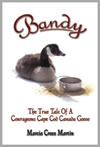
What readers had to say:
"Bandy is a testament to
the power of love, faith, and friendship and is a great read
for animal lovers and children alike. This is a delightful,
heartwarming story that will leave you pondering your own
reactions to the trials and tribulations of life. Three
honks for Bandy!" -- KAT ALBRECHT, author of "The Lost Pet
Chronicles: Adventures of a K-9 Cop Turned Pet Detective."
"Bandy's story is
remarkable. The friendship that develops between an injured
Canada goose and the generous woman who rescues him makes
for a tale of mutual trust and courage. Marcia Martin has
written a highly entertaining book that every animal
enthusiast will love." -- BOB TARTE, author of "Enslaved By
Ducks."
"Bandy" can be ordered
directly from the author through the
Bandy the Goose website
or through
Amazon.com.
Reader Poll #6
Question: If you
determined that some wild ducklings or goslings you found
were orphaned, what would you do? (Be honest!)
Results of Reader
Poll #5 Do you
believe your birds are safe from predators?
|
Yes |
50% |
| No |
33% |
|
Not sure |
17% |
| |
|
Contact Us
Majestic Waterfowl
Sanctuary
17 Barker Road
Lebanon, CT 06249
directorATmajesticwaterfowl.org
Our Newsletter
The Majestic Monthly is published 12 times per year. Back
issues can be obtained online from our
Newsletter Archives.
|
|
Jonah and
Joseph Happily Ever After
Friday
the 13th may be unlucky for some, but not for our Pekin drakes
Joseph and Jonah. Their new mom drove all the way from Kentucky to
adopt the two best friends.
Jonah has been in our
care since last fall after his rescue from Spaulding Pond. Although
several families inquired about him, he watched as each of his pond
mates were placed into new homes. Jonah is quite large and a bit shy
around people, but once accustomed, he loves a good feather rubbing.
Joseph joined us
earlier this year after being dropped off on a pond before
a snowstorm. He was severely underweight and someone had cut off his
wing feathers. We were able to quickly turn his health around and
get this once lame duck on his feet again and walking. Joseph has
since become an extremely friendly lap duck who loves tons of
attention and snuggles, and as for Joseph’s Dreamcoat, his plumage
is gorgeous!
When we put the two
boys together to see how they would do, they surprised us by
becoming the best of friends. We’ve never seen two drakes get along
better—especially during the mating season when drakes tend to
squabble.
It was a great day at
Majestic when the Huffmans decided to adopt both of the boys. They
were each put into their own spacious pet carrier on Saturday for
the first leg of their journey. The boys arrived safely home on
Sunday whereupon they met Qwaka and Fiona, the Huffman’s Pekin hens.
Both drakes are doing
wonderfully in their new homes and waddling down flirtation path
with their new girls.
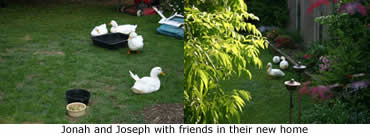
Helping Wild Ducklings
and Goslings
We
receive many inquiries regarding wild waterfowl in need of
assistance. During the spring and summer months, many concerned
people contact us about abandoned ducklings and goslings. If you
encounter orphaned or injured waterfowl, please contact your nearest
wildlife rescue center or licensed wildlife rehabber (links to
directories of rehabbers are provided below).
At this time,
Majestic Waterfowl Sanctuary does not have any staff members who
hold a state or federal wildlife permit, although acquiring both are
in our future goals. This means we
cannot rescue and rehabilitate wild waterfowl at this time. In the meantime, we rely on our
friendly licensed wildlife rehabbers to handle issues with wild
waterfowl.
If a wild duck,
goose, duckling or gosling is in immediate danger, you may carefully
and humanely capture it and arrange for its immediate transfer to a
licensed wildlife rehabber. If the bird is not in immediate danger,
but you are concerned about it, contact a wildlife rehabber for
advice BEFORE intervening. Don't assume that ducklings or eggs have
been abandoned just because you do not see their mother nearby.
Avoid the temptation of disturbing a nest until after you've
discussed the situation with a licensed rehabber.
I know how darling
those little ducklings/goslings are, but you must keep their best
interests in mind, and set your own desires aside. Wild ducklings
need to be taught to forage for natural foods and they need to learn
to exercise their wings and learn to fly. It is vital that wild
ducklings do not imprint on humans (that means YOU!). If a wild
duckling imprints on a human rather than a duck, they won't fair as
well in the wild. They may not act appropriately around other ducks
and become outcasts, or they may seek out humans once released,
which could prove harmful. Remember, just because you mean well,
doesn't mean the next person they encounter will. A licensed
rehabber has the training to take care of wild ducklings and ensure
that they can be released safely back into the environment.
Do not feed injured
or abandoned wild waterfowl until you have received advice from a
rehabber (if you can't find one right away, call a vet who is
experienced with waterfowl care). Place the duck into a protective
container (preferably a pet carrier if you have one on hand). Line
it with an expendable dry towel free of any loose strings that might
be ingested or cause tangles. Make a small water source
available--nothing that can spill and make a big mess. You want your
temporary guest to be warm and cozy, but not hot--remember an adult
duck's feathers are excellent insulators. Ducklings should be kept
warm and draft free. Avoid using newspapers for bedding; they can
remove the oil from a duck's feathers. You can use hay or pine
shavings, but avoid cedar shavings as they can irritate their skin.
Try not to disturb
the duck. Let it rest quietly in a safe and closed off room until
you can arrange for it to be delivered to a rehabber. Be extremely
cautious that neither children or family pets have access to the
duck.
As a preparative
measure, begin to take notice of business cards of licensed wildlife
rehabbers in your area. Often times they are available at your vet’s
office, humane society or pet supply stores. Take their card, or
copy their information, so that you will have their contact
information on hand in the case of a wildlife emergency. Usually,
the card will indicate the types of animals they are licensed to
handle, but in an emergency don’t be afraid to call them regarding a
type of animal that they do not handle. Rehabbers are famous for
having a wonderful network of connections. They may be able to
direct you to someone who can help in your particular situation.
Wildlife Rehabber Contacts
Locating A Wildlife Rehabber
Here is a helpful
resource with diagrams that you can print up and have on hand in the
case of an emergency. Click on this link:
Wildlife Rescue Foundation
Then click on: “I
found a baby bird, now what!”
Get to Know Your
Predators: The Fox
Your best defense is a good offense!
A WORD ON RABIES…
Whenever dealing with wild animals, be it the animal
itself, or the remains of its kill, ALWAYS wear protective clothing.
DO NOT touch wild animals or prey animals (either living or dead)
with your bare skin. Thoroughly clean or discard any clothing or
items that have touched the wild animal or prey animal.
A
fox tends to
weigh between seven and fifteen pounds. Although they are primarily
nocturnal, it is not uncommon to see them during dawn and dusk
hours.
They are expert
and stealthy hunters who tend to remain unseen even when close by.
They often live very close to people without ever being discovered,
so don’t assume you don’t have any around just because you don’t see
them.
Foxes tend to
grab their prey and run off with it without leaving a trace. If you
have a sudden and unexplained duck disappearance with no remains
left behind, a fox is a likely suspect, and it will be back.
Because foxes are
shy and prefer to remain unseen, motion sensing lights around your
duck house may help deter them. A good guard dog is an excellent
deterrent. Often the scent markings of a dog will keep a fox on its
toes, but not necessarily away. A hungry fox will watch and wait
diligently for an opportunity to seize an unprotected duck. We’ve
heard stories of the family dog going in the house, duck owners
turning their back for a minute and the fox seizing the moment. You
may not see them, but they see you.
Waterfowl Nutritional
Requirements
The
first question many first time waterfowl owners ask is, "What should
I feed them?" Unfortunately, many make the mistake of feeding their
ducks and geese chicken feed or worse, feeding medicated chick
starter to goslings and ducklings. These feeds are fine for
chickens, but waterfowl have unique nutritional needs that chicken
feeds cannot supply. Furthermore, medicated chick starters can cause
organ damage or even death if ingested in large enough quantities.
Ducklings and
goslings need sufficient niacin in order to develop strong, healthy
legs. Signs of niacin deficiency are weak legs and difficulty
standing or walking. The condition is often reversible if caught
early enough and involves switching to a niacin rich waterfowl feed
along with niacin supplementation (brewer's yeast flakes are tasty
and rich in niacin). If the dietary deficiency is not corrected,
permanent leg damage may result.
The best feed on the
market for waterfowl is Mazuri brand. You can order direct from them
at
www.mazuri.com. For additional information on
waterfowl nutritional requirements and available feeds, please visit
our
website.
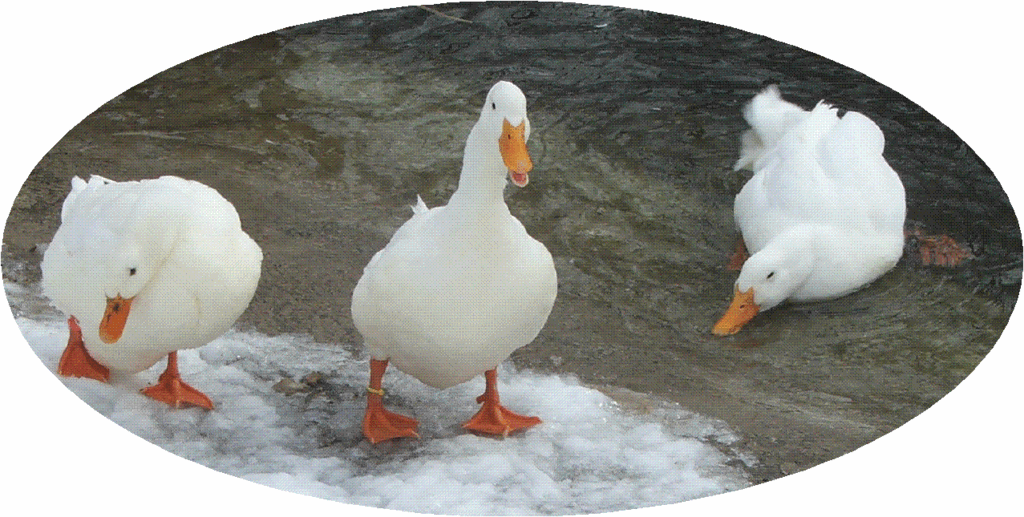
|